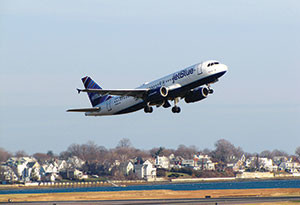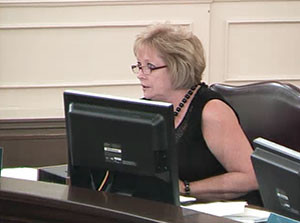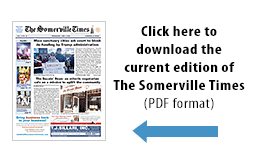
The City of Somerville is considering taking similar steps as Cambridge is doing to measure noise levels of overflying airliners coming and going at Logan International Airport.
By Jim Clark
At its latest regular meeting on Thursday, September 10, the Somerville Board of Alderman was presented with a proposed Policy Order that was recently adopted by the city of Cambridge in regards to air traffic noise pollution issues.
Alderman at Large Mary Jo Rossetti, who brought the item to the Board’s attention, spoke in favor of giving serious consideration to Cambridge’s approach to dealing with the problem.
“What Cambridge has asked is that their community consider purchasing equipment to help in registering the noise levels,” Rossetti explained. “I continue to get really angry emails and phone calls from people who are beyond frustrated. I know we’ve been talking about this for over a year now. So I’m putting this forward, hoping it will be forwarded to Public Health and Safety.
“We need to try everything we can because what we’ve been trying to date hasn’t been effective,” Rossetti continued. “I know that I’ve spoken with Skye (Stewart) over at SomerStat and she has promised me that they have some strong data and she is requesting additional data from the airports, because what is in Somerville’s records does not mirror what is in theirs.”
“This is just one more notch to be added to the very large file, and I’m hoping we will give it strong consideration.”

Alderman at Large Mary Jo Rossetti says that after receiving endless complaints by constituents she is recommending that the city adopt similar measures as Cambridge to fight back against excessive air traffic noise pollution.
The Order put forward by Councillors Craig A. Kelley and Leland Cheung to the Cambridge City Council states as follows:
“WHEREAS: Air traffic over Cambridge has increased considerably in recent months; and WHEREAS: Noise associated with new air traffic patterns from Logan International Airport, smaller airplanes, and helicopters can be as high as 75 decibels or more on the ground at various hours of the day; and WHEREAS: There is an ongoing discussion about the noise impacts of these new patterns; and WHEREAS: Cambridge could better participate in these discussions if it had relevant data about the decibel levels and times associated with overhead planes; and WHEREAS: Equipment exists to provide ongoing noise measurement for relatively low cost; now be it therefore ORDERED: That the Council go on record expressing concern about the increased noise in Cambridge due to new airplane patterns and the lack of solid data about the level and times of these noise disturbances; and be it further ORDERED: That the City Manager be and hereby is requested to confer with relevant City staff to design, fund and implement an ongoing noise measurement program in the current budget year that utilizes sufficient equipment to measure ongoing noise issues; and be it further ORDERED: That the City Manager be and hereby is requested to report back to the City Council on this matter.”
Essentially, the Order recommends that the city purchase relatively inexpensive monitoring equipment to record air traffic noise levels, thus assuring accurate measurements with which to deal with the problem when negotiating with Logan Airport authorities.
Board President William A. White Jr., in commenting on the proposal, said, “The problem is MassPort does not have noise metering devices for their communities. They have a few of them located throughout the Greater Boston area, and then they use computer modeling, supposedly, to figure out what the noise impact is and I think it makes sense to the extent that we take actual measurements, because I would trust actual measurement versus computer modeling.”
The item was subsequently approved by the Board to be referred to the Committee on Health and Public Safety for further consideration.















Reader Comments